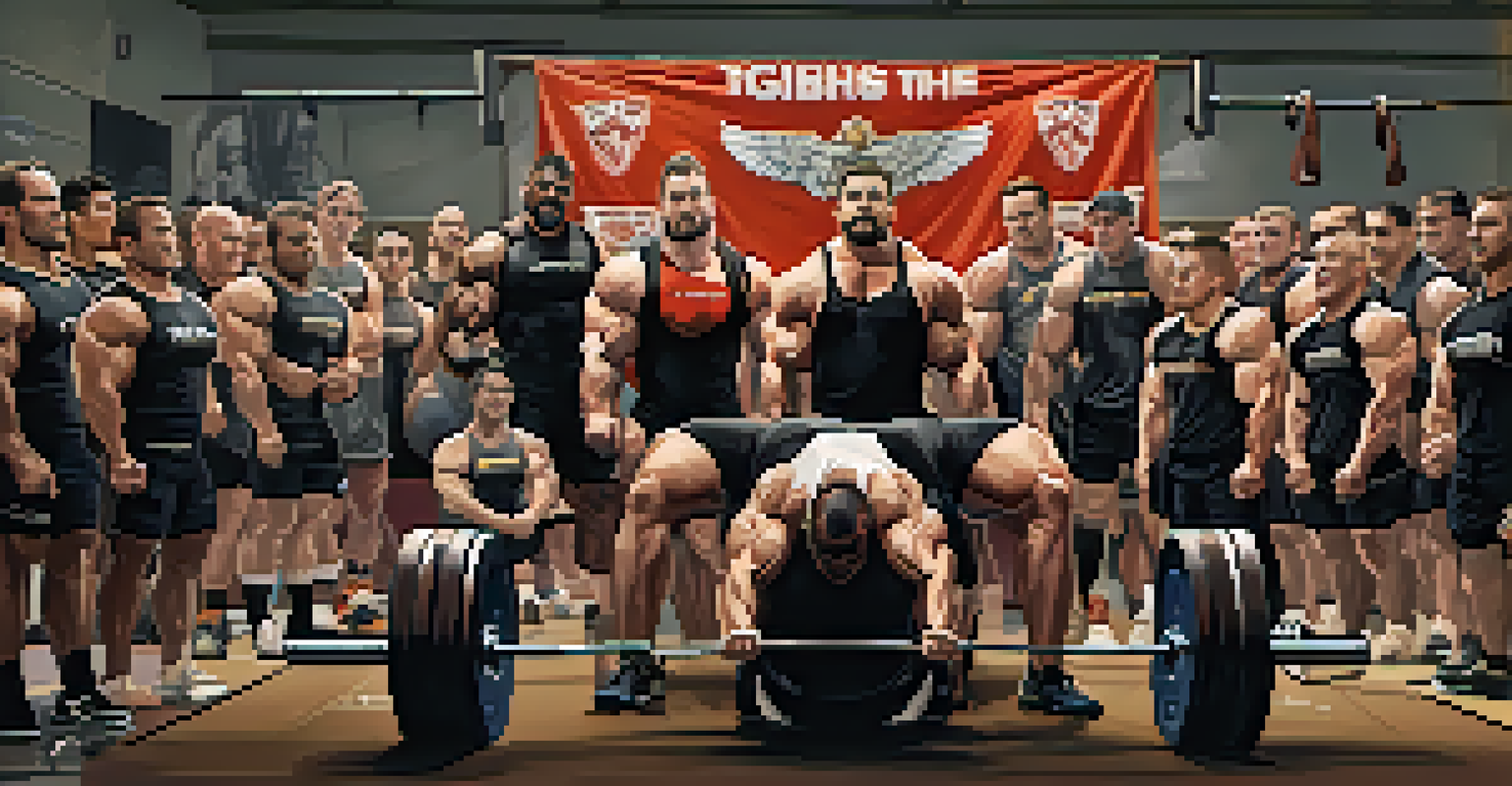The Connection Between Powerlifting and Mental Toughness

Understanding Mental Toughness in Powerlifting
Mental toughness is often defined as the ability to stay focused and resilient in the face of challenges. In powerlifting, this means pushing through physical discomfort and self-doubt during intense training sessions. It’s about developing a mindset that can handle both the physical and psychological demands of lifting heavy weights.
What lies behind us and what lies before us are tiny matters compared to what lies within us.
Just like athletes train their muscles, they also need to train their minds. This includes setting clear goals, visualizing success, and preparing mentally to face obstacles. A powerlifter who cultivates mental toughness is more likely to overcome setbacks and perform better during competitions.
Ultimately, mental toughness in powerlifting is a combination of confidence, perseverance, and the ability to maintain a positive attitude. This resilience not only helps lifters succeed in the gym but also translates to other areas of life, making them more adaptable to challenges.
The Role of Routine and Discipline
Establishing a routine is crucial in both powerlifting and building mental strength. Consistency in training schedules fosters discipline, which is a core component of mental toughness. When lifters commit to their training, they develop a sense of accountability to themselves and their goals.

Routines also help manage the psychological demands of lifting. Knowing what to expect in each training session can reduce anxiety and increase focus. As lifters repeat their routines, they learn to push through fatigue and discomfort, building resilience with every lift.
Mental Toughness Boosts Performance
Developing mental toughness through focus and resilience helps powerlifters overcome challenges and perform better.
Moreover, this discipline extends beyond the gym. Lifters often find that the routines they establish in their training help them manage stress and responsibilities in their daily lives. The discipline learned through powerlifting can create a strong foundation for mental toughness in various situations.
Facing Fear and Overcoming Challenges
In powerlifting, fear often manifests as the anxiety of lifting heavy weights or attempting new personal records. This fear can be paralyzing, but confronting it head-on is essential for growth. Each time lifters face their fears, they build both physical strength and mental resilience.
Success is not final, failure is not fatal: It is the courage to continue that counts.
Overcoming these challenges requires a shift in mindset. Instead of viewing heavy lifts as threats, lifters can learn to see them as opportunities for growth and development. This shift helps cultivate a more positive outlook and enhances their mental toughness.
Additionally, sharing these experiences with fellow lifters can create a supportive environment. Encouragement from others not only helps in facing fears but also reinforces the idea that challenges are a natural part of the journey.
The Power of Visualization Techniques
Visualization techniques are powerful tools used by many athletes, including powerlifters. By picturing successful lifts and their desired outcomes, lifters can enhance their focus and boost their confidence. This mental rehearsal prepares them for the actual performance, making their lifts feel more attainable.
Practicing visualization helps lifters create a mental blueprint for their lifts. This process can alleviate anxiety and improve performance by allowing them to mentally experience the lift before they attempt it. The more vivid and detailed the visualization, the more effective it becomes.
Routine Builds Discipline and Strength
Establishing consistent training routines fosters discipline, which is essential for mental toughness and resilience.
Incorporating visualization into their routine not only helps lifters during competitions but also strengthens their mental toughness. It reinforces a winning mindset and instills confidence, making the lifting experience more rewarding.
Building Community and Support Systems
The powerlifting community plays a significant role in fostering mental toughness. Being part of a supportive group can help lifters stay motivated and accountable to their goals. This sense of belonging can reduce feelings of isolation, which can often accompany challenging training sessions.
Sharing experiences and challenges with others creates a network of support. Lifters can share tips, encouragement, and even their struggles, which can help them cope with the mental pressures of the sport. Knowing that others are facing similar challenges can be a comforting realization.
Additionally, having training partners or mentors can push lifters to confront their limits. This external support encourages them to take risks, push through fear, and strengthen their mental resilience.
Embracing Failure as a Learning Tool
Failure is a part of any athlete's journey, and powerlifting is no exception. Instead of viewing failure as a setback, lifters can embrace it as a valuable learning opportunity. Every failed lift teaches a lesson about technique, preparation, and mindset, which can contribute to future success.
Acknowledging failure helps build mental toughness by reinforcing the idea that setbacks are not permanent. Instead of giving up, lifters learn to analyze what went wrong and adjust their strategies. This ability to adapt is a key aspect of resilience.
Community Support Enhances Resilience
Being part of a supportive powerlifting community provides motivation and encouragement, reinforcing mental toughness.
Moreover, sharing stories of failure and recovery within the community can inspire others. It highlights that everyone faces challenges, and overcoming them is what ultimately builds strength—both physically and mentally.
The Long-term Benefits of Mental Toughness
The mental toughness developed through powerlifting extends far beyond the gym. It equips individuals with the resilience to face life's challenges, whether personal or professional. This newfound strength can improve problem-solving skills, enhance emotional regulation, and foster a more positive outlook on life.
Many lifters find that the discipline and determination they cultivate in the gym spill over into their daily routines. They become better equipped to handle stress, manage time effectively, and pursue their goals with greater confidence. This holistic development is one of the most rewarding aspects of powerlifting.

Ultimately, the connection between powerlifting and mental toughness is a powerful one. As lifters grow stronger physically, they also develop an unshakeable mindset that can guide them through life's ups and downs, proving that true strength is as much about the mind as it is about the body.